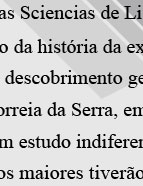

................................
Once the independence of Brazil had been achieved (1822) and recognised (1825), the Portuguese possessions in Africa - above all - began to be seen as a sacred heritage of the homeland (and therefore an untouchable heritage) and as an economic solution to Portugal's difficulties at the time. As stated by Oliveira Martins in 1882 in História de Portugal [History of Portugal] (3rd ed.) "...only at the expense of colonial resources can we perhaps satisfy the multiple demands of economic, scientific and moral organisation, which are indispensable to the existence of a nation nowadays ". It was also the opinion of Luciano Cordeiro, a self-professed colonialist of the 1900s, that equatorial Africa "might mean another Brazil to us and it is extremely painful to see the time that has been wasted". (Boletim da S.G.L. [S.G.L. Bulletin], no. 1, 1876). This colonial presence was thus deemed to have existed uninterruptedly since the 15th and 16th centuries. Such a lengthy permanence justified present ownership, the primacy and continuity of which had to be highlighted in the face of the desires and ambitions of other European states. History was therefore a fundamental element of proof. "Historical arguments, diplomacy, and African policy went hand in hand. [...] history took on the pragmatic function as an instrument of the national State in its foreign policy". (S. C. Matos, "A historiografia portuguesa dos descobrimentos...", [“Portuguese historiography of the Discoveries…”], 1998, p. 56).
Such an interest in questions of knowledge of the history of expansion, also referred to as knowledge of geographical discovery, was sparked by the Academia Real das Sciencias de Lisboa [Lisbon Royal Academy of Sciences] since, as mentioned by Abade [Abbott] Correia da Serra in 1790: "As far as we are concerned, the History of Portugal is not an indifferent study, or mere curiosity. The accomplishments of our forefathers had such consequences that the whole of the human race, even its strangest elements, is interested in them"] (Collecção de livros.. [Collection of books…] tome I, 1790, p. VII). The Collecção de noticias para a Historia e Geografia das Nações Ultramarinas [Collection of news for the History and Geography of Overseas Nations] would be published sometime later, in 1815. Erudition asserted itself and key documents for the study of the period and of the discoveries began to be published. The initiatives of the Academia de Ciências (1812-1841) were particularly noteworthy in this regard. From early on, historical knowledge - and the driving force behind those who took an interest in it - was mainly based on the opinion of Herculano, who had convincingly argued that the great period of the constitution of the Nation was the Middle Ages.
